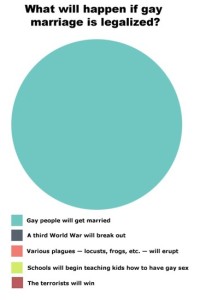
The Supreme Court ruling finding Same Sex Marriage (from here on out, SSM) bans unconstitutional has unsurprisingly sparked a great deal of “debate” (using the term loosely). While some opponents to the decision don’t bother to hide the fact that the motivation for, and only reasoning behind their opposition is homophobia, others have taken to the only available counter argument worthy of a response shorter than a link to a Wikipedia article defining a logical fallacy. That argument hinges on the right of a state within the country to self govern in such a way that reflects popular opinion within their boundary. So, the argument runs, it’s an unacceptable violation of this right for the federal government to impose a ruling that goes against popular opinion in a given state. Please note here that this is the strongest formation of the argument I have come across, and if a stronger one is encountered, please feel free to provide it. I have no intention of fighting against a mere straw man.
Taken out of the context of SSM, we can see how this argument might run and come out with a reasonable conclusion. Let’s take scrapple. Scrapple is a widely popular dish within Pennsylvania, but outside of the state’s boundaries, is often seen as disgusting and repulsive (the Wikipedia article linked above does describe its main ingredients as “mush of pork,” so there may be some merit to finding scrapple repulsive). Let’s imagine that for whatever reason, the federal government decided to ban the selling and consuming of scrapple (perhaps simply because they found it disgusting). The state of Pennsylvania and its citizens would have a reasonable case for finding this ruling problematic. Sure, the federal government might find scrapple repulsive, perhaps even the rest of the world might find scrapple repulsive, but in PA popular opinion favors scrapple, and a federal ruling against it seems invasive and unnecessary.
This analogy to scrapple, weak as it is, at least provides some clarity on the functionality of the states’ rights argument (from here on out, SRA). Alas, as might be gleaned from the analogy, the argument only functions properly so long as there is no ethical justification for the ban imposed by the federal government. This is to say that SRA hinges on the condition that the argument/ruling/legislation it attacks is a matter of subjective opinion, and that no substantive argument can otherwise be provided for or against the position.
Going back to our scrapple example, a person may like scrapple, or they may find it repulsive. But any arguments one might fashion to defend either view are merely subjective, and appeal to a matter of taste (“I find the texture of scrapple pleasing!” “Scrapple looks unappetizing, and the ingredients used to make it are disgusting!”). No real objective stance can be taken here, and thus it’s reasonable to appeal to popular opinion.
When dealing with any argument where morality is concerned, however, the SRA can be torn apart like wet tissue paper. Doing so, for the most part, requires only an imagination for moral unpleasantries that might be permitted in a given jurisdiction via popular opinion. In this way, the SRA is very comparable to moral subjectivism, the belief that morality is merely a matter of opinion, and may vary widely from one culture to another. This connection is why I will provide a lengthy counter argument to show why the SRA is fundamentally flawed in its application to marriage equality, or any other moral matter.
I. The Segregation Analogy
For those of you that will need the least convincing, I’ll start with a very simple analogy that will sufficiently demonstrate the weakness of the SRA and moral relativism in relation to the SCOTUS ruling on SSM. This analogy will demonstrate, via reductio ad absurdum, that accepting the SRA’s application to moral issues (and to a lesser extent, moral relativism) leads to absurd and untenable consequences, and therefore ought to be rejected.
De jure segregation during the 20th century was presumably backed by a very large degree of public opinion. Racism was wildly rampant, and it’s reasonable to suppose that many Americans were not only in favor of racial segregation, but saw blacks as fundamentally inferior to whites. And yet, through Supreme Court decision, overtime the country began to realize the moral error that had been made.
While the Supreme Court decision itself did not sway the hearts and minds of Americans, leaving many opposed to the newfound recognition that “separate is inherently unequal,” it nonetheless passed. It would be plausible, if one is to accept SRA as a premise, to say that states rights to self govern according to popular opinion within their boarders was infringed by the banning of racial segregation. Surely there were a number of southern states where the majority favored segregation, and yet it was banned.
If SRA and its application to moral ideas is accepted as a premise, it should still be morally permissible for states to racially segregate if this is what voters in a given state prefer.
Exempt the remaining vehement racists in this country (a large enough number still remain, unfortunately), I think most will recognize that the consequences of SRA when applied here are tremendously problematic. We recognize now that segregation was in fact morally wrong, and based merely on racist sentiments with no real backing. SRA must be rejected in this case.
One might attempt to grant here that SRA must be rejected in its application to racial segregation, but contend that SSM is sufficiently different from segregation such that SRA should still apply. Arguments attempting to draw this distinction between the two cases, so that SRA is still applicable to SSM without being applicable to segregation, are bound to fail. The two cases are sufficiently similar such that if one rules in favor that SRA is not applicable to one case, the same decision must apply to the other.
Both present an instance where a SCOTUS decision ruled that a practice was unconstitutional. Both present an instance where a demographic were/are treated as second-class citizens with fewer rights because of something they can’t change about themselves. Both present an instance where bigotry was the only motivation behind a practice.
Now, in order to attempt to draw a distinction between the two cases, one would have to provide an argument as to why SSM is morally wrong. If this could be done, it would sufficiently separate SSM from racial segregation, and perhaps not only allow the SRA to function so that states ought to be able to decide whether SSM is permissible within their boundaries, but push back in favor of a federal banning of SSM. After all, if something can be proven to be morally wrong, it ought not to be done, and if it ought not to be done, it is reasonable to suppose that one might favor a legal prohibition.
Prohibition against an equal treatment for one demographic under the law, taken in abstract form, is uncontroversially morally reprehensible. If the law were to prevent the granting of rights to people with blonde hair, or people who enjoyed scrapple, for instance, we would not hesitate to call the law unjust. There is no difference here. I will say again, this is an instance of a demographic being given unequal rights under the law because of something about them they cannot change. The banning of the rights that come with a legal marriage license to a demographic of citizens is unjust.
The first set of “arguments” that I will deal with that attempt to draw this distinction between the two cases and show that SSM is morally wrong are religious ones. As I’ll explain in the next section, there is sufficient reason to regard “religious arguments” as something of an oxymoron, especially as applied to law. The second set of “arguments” that I will deal with are secular ones. These arguments are almost entirely logically flawed, or just generally too weak to put any pressure on SSM. Finally, I’ll deal with moral relativism as a general principle to supplement this section, and show that one cannot forward the SRA in regard to moral issues, as doing so would lead to tremendously undesirable consequences.
II. Why Religious “Arguments” are Irrelevant
In order for an argument to be sound, it must contain true premises. In order for premises to be “true,” they must be objectively true. Religious arguments hinge on religious principles of various kinds and use them as premises to defend their conclusions. Religious principles are by their very definition, non-objective.
Religion, in its essence, is based on faith and belief, not fact, and not evidence. Faith and belief have no value in argument, as they are non-objective. As non-objective values, their truth as premises cannot be verified. This means that even upon completing a valid argument, soundness can never be granted so long as the argument includes religious principles. Defending against a religious argument is as simple as “Well that may be true for you, because you believe in X, but since I do not, your argument does not apply to me.”
We can see clearly how this functions in relation to SSM. A Christian, for example, may well be able to establish a valid argument that hinges on interpretation of some bible passage or another, but at the end of the day, so long as the audience for the argument is not Christian, the argument has no weight. The premises remain unverifiable, and thus, the argument is unsound. This is why no argument against SSM that contains subjective premises derived from religion is tenable.
As an additional counter argument, one need only brush up on Plato’s Euthyphro, which contains one of the most famous counter arguments against the relevance of religious principle in evaluating morality. For those unfamiliar, the text is centered around a young man named Euthyphro, who intends to prosecute his father for manslaughter. Euthyphro encounters Socrates, and the two discuss the morality of such an action, and Euthyphro attempts to defend himself to Socrates. Socrates challenges Euthyphro to define piety, as Euthyphro has claimed that prosecuting his father is pious.
Euthyphro’s third attempt at defining piety, and thus justifying his action as morally permissible, appeals to religion. Euthyphro suggests that piety is what is pleasing to (all of the) god(s), such that what is pleasing to them/Him is pious, and what He/they hate is impious. It is here that Socrates asks the question relevant to our conversation: “Is the pious loved by the gods because it is pious, or is it pious because it is loved by the gods?”
While I encourage the reading of the original text and a study of its interpretation to have the full effect, I will briefly summarize what this question means for religious arguments. Socrates sets up two possibilities, either (1) something is moral because God loves it, or (2) God loves things that are moral.
If (1) is true, and a thing becomes moral only because God loves it, the definitions of morality are arbitrary. What’s to stop God from changing His mind, thus rendering something previously moral, now immoral, or vice versa? If (1) is true, morality is left to seem deeply unsatisfying. If (2) is true, then there is some deeper reason for why a given thing is moral or immoral, as God’s love or distaste for the action has something to do with the action itself, not merely because of God’s arbitration.
This, in effect, means that relying on religious principles to justify a vision of morality does not provide the whole picture of why a given action is moral or immoral. It would instead provide a mere anecdote, and the root of the issue is left untouched. Justification of an argument that attempts to show that an action is moral or immoral, cannot rely on religious principles, for this reason.
III. Other Flawed Secular Arguments Against SSM
There exist a wide variety of secular “arguments” (again, using the term loosely) against SSM, but they are all deeply flawed, or patently fallacious. I’ll list a few of them here, with short explanations of their flaws and thus grounds for their outright dismissal.
“If SSM is permissible, then there are no grounds to prevent polygamy, bestiality, incest, or pedophilia!”: This argument runs a classic slippery slope argument, which is fallacious so long as evidence is not provided which makes the inference reasonable. A slippery slope argument seeks to show that if one action happens, a second (or series) of undesirable consequences will inevitably follow. The first issue with slippery slope arguments generally speaking is that it is tremendously difficult to argue that a set of consequences are necessitated by an action. Such a proof requires a very high burden of evidence to become plausible. Non-fallacious slippery slope arguments do exist, but one needs to clearly establish that the first action has lead to certain consequences in all (or nearly all) other cases. With respect to SSM giving way to bestiality etc, the evidence to support the slippery slope argument does not exist. In fact, there is evidence to the contrary. Many countries, including the Netherlands, Belgium, Spain, Canada, South Africa, Norway, Sweden, Portugal, Iceland, Denmark, Brazil, France, Uruguay, New Zealand, the UK, Luxembourg, Finland, and Ireland all legally permit SSM. Very few of these countries legally permit bestiality, for example. To show an inevitable link from SSM to bestiality, one would need all, or quite nearly all countries that have legalized SSM to have also legalized bestiality. This is not the case, so the argument falls flat.
Additionally, there are two counter arguments that work to effectively separate SSM from the myriad of other problematic cases. The first counter argument runs on consent. With SSM, there is consent between both rational, autonomous agents, who choose willingly to engage in an activity between the two of them. Via any number of moral theories, consent between two parties engaged in an activity that affects no other parties is permissible. Any challenge here would need to show that the activity being performed adversely affected others who had not consented to the activity, perhaps via the Sanctity of Marriage Argument, which I’ll cover later.
The second counter argument might be aptly named the “why do you give a shit” argument. This argument anticipates rebuttals to the consent argument, where one might take issue with the practices of consenting parties. Using polygamy this time as an example, let’s suppose one worries that SSM will lead to polygamy. Assuming that all parties involved in the polyamorous marriage are consenting, why is polygamy problematic? If your answer has something to do with the sanctity of marriage, see the next section. If your answer has something to do with undesirable consequences of polygamy for those involved, I refer you again to the consent argument. Adults may willingly consent to take on risks associated with actions, and if entering a polygamous marriage presents a number of emotional or medical risks, there is no reason to see these risks any different from consenting to skydiving, or boxing.
“If SSM is permissible, the sanctity of marriage will be destroyed!” The very concept of sanctity ties very closely to religious principles, so for the most part I’ll refer you to the previous section regarding religious arguments. Taking this counter as an exclusively secular argument, referring to the “institution” of marriage, or perhaps the health of other marriages in a given country, I’m afraid I can do little more than scoff. Prior to the federal legalization of SSM, was marriage really a sacred institution otherwise unscathed? What about these issues? 1, 2, 3, 4,
Furthermore, I might refer you back to the “why do you give a shit” argument, in the sense that I fail to see how what two (or more) people consent to has any impact on your marriage, or marriage as a concept or institution. When little children pretend to be married to one another as a game, does this disrespect and damage the institution of marriage? If one thinks that marriage is such an important institution, I’d hope that it’s strong enough to withstand child’s play, and general misuse at the hands of others. Even if you find SSM somehow distasteful (because you’re a homophobe), it remains unclear on how two men or two women getting married has an impact on heterosexual marriage as a concept.
“What about the children!?”: What about them? The suggestion here is that SSM leading to same sex couples raising children will damage them and their development. Proponents of this argument will sometimes attempt to cite studies that there is not enough evidence to prove that there isn’t a substantive difference in children raised by homosexual and heterosexual couples. So, let’s suppose for sake of argument that there is in fact a lack of evidence to show whether there is a difference, or more importantly if active damage is done to children raised by two men or by two women. Why suppose that there’s an issue here at all? Sure, lacking the evidence that there isn’t a difference isn’t enough to say for a matter of fact that there isn’t, but what would lead one to assume that there is? The answer, inevitably, is homophobic tendencies and cultural ideals that place undue value on heterosexual parenting.
But, let’s ignore the motivations of the argument to be fair to it. Until there is evidence that gives us reason to worry that homosexual parenting damages children in a way that heterosexual parenting does not, I fail to see why the issue is being raised. It’s a bit like worrying that not eating a healthy balanced breakfast as a child will lead to becoming a serial killing communist pedophile. Is it possible that failure to eat a balanced breakfast as a child will lead to becoming a serial killing communist pedophile? Sure! Is there evidence, or any reason to spark a worry about this? Um…
IV. The High Price Tag of Moral Relativism
Let’s suppose you’ve read through all of this, and still aren’t convinced. Following the SRA, and placing an incredibly high value on democracy and people’s ability to self-govern (which, perhaps you should come to realize, also means your ability to control your next-door neighbor, and his ability to control you. This isn’t about freedom and liberty and autonomy like you think it is. If it were, and you and your neighbor had no business telling each other how to live, you would be in favor of SSM), you still think states should be able to decide for themselves whether to permit SSM, because some people don’t like it but still think it’s immoral, and if gay couples don’t like it, they can move to another state where it’s allowed.
What you’re espousing is essentially moral relativism. As a reminder, this is the belief that morality is subjective, and a given culture or group of people should be able to set their own standards for what is and isn’t morally permissible. You’re suggesting that because some people find SSM distasteful or claim that it’s immoral, they should be able to decide within their own communities whether or not to permit it. So, if popular opinion within a community finds SSM “immoral,” that community can rightfully ban SSM.
Spoiler alert: Your old friend reductio ad absurdum is about to rear its ugly head again. Moral relativism has incredibly ugly entailments when accepted wholesale. This section will be nothing more than a fun little list of the cans of worms opened up by accepting moral relativism, by imagining a given community (I’ll call it community X, but one can imagine the Deep South or an alternate reality where Nazi Germany won WWII, if one prefers)
- Community X agrees by popular opinion that black people are a stain on humanity and should be eradicated. They proceed to lynch every black person they can find. Adhering to moral relativism and as an outsider to community X, you have no grounds with which to protest their actions.
- Community X agrees by popular opinion that homosexuals are a stain on humanity and should be eradicated. They proceed to lynch every homosexual they can find. Adhering to moral relativism and as an outsider to community X, you have no grounds with which to protest their actions.
- Community X agrees by popular opinion that blondes are dumb, and whores, and shouldn’t reproduce. They proceed to have every blonde either lynched, or forcibly sterilized so they can’t reproduce. Adhering to moral relativism and as an outsider to community X, you have no grounds with which to protest their actions.
- Community X agrees by popular opinion that Jewish people are a stain on humanity and should be eradicated. They proceed to lynch every Jewish person they can find. Adhering to moral relativism and as an outsider to community X, you have no grounds with which to protest their actions.
- Community X agrees by popular opinion that it’s super fun to light 10 year old girls on fire for the mere pleasure of watching them burn. Once a month, they proceed to light 10 year old girls they select at random. Adhering to moral relativism and as an outsider to community X, you have no grounds with which to protest their actions.
- (This one goes out to the people who took issue with section III) Community X agrees by popular opinion that goats make the best bed partners. They proceed to “breed” as many goats as they can to “breed” with. Adhering to moral relativism and as an outsider to community X, you have no grounds with which to protest their actions.
- Community X agrees by popular opinion that homophobic people are a stain on humanity and should be eradicated. They proceed to lynch every homophobic person they can find. Adhering to moral relativism and as an outsider to community X, you have no grounds with which to protest their actions.
- Community X agrees by popular opinion that racists are a stain on humanity and should be eradicated. They proceed to lynch every racist they can find. Adhering to moral relativism and as an outsider to community X, you have no grounds with which to protest their actions.
The list goes on, and is limited only by your imagination, as I’m sure you can see at this point. Moral relativism has very, very ugly repercussions, and cannot be accepted as a premise. This means that moral relativism cannot be used to support the SRA, and any iteration of the SRA that banks on moral relativism ought to be outright rejected.













